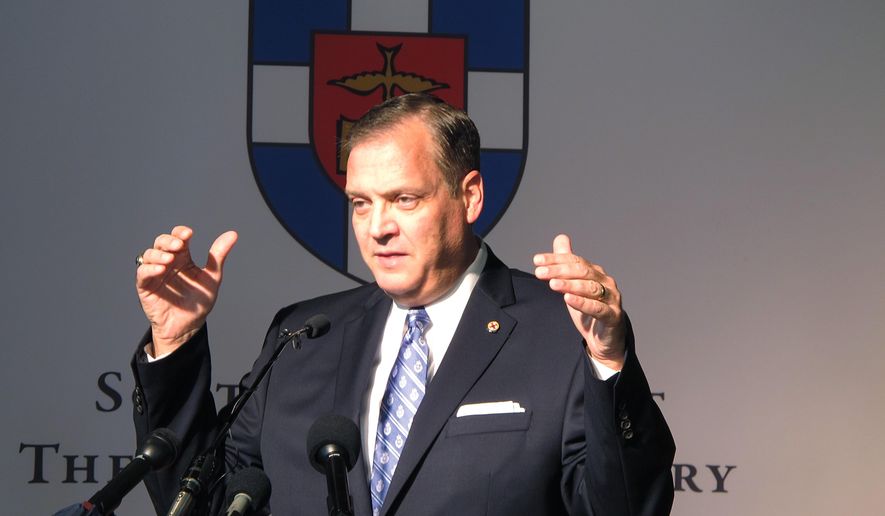The presidents of the six seminaries of the Southern Baptist Convention (SBC) have called critical race theory “incompatible” with the faith’s values.
In a statement published Monday, the Council of Seminary Presidents of the SBC reassured followers that their professors reject racism but could not condone what some consider a radical school of thought on race and culture.
“In light of current conversations in the Southern Baptist Convention, we stand together on historic Southern Baptist condemnations of racism in any form,” the statement reads. “[A]nd we also declare that affirmation of Critical Race Theory, Intersectionality, and any version of Critical Theory is incompatible with the Baptist Faith & Message.”
The statement did not elaborate on why the seminary leaders found the theory untenable with the theology of the nation’s largest Protestant denomination. The Baptist Faith & Message is a statement of faith, mostly recently revised in 2000.
However, Albert Mohler, president of the Southern Baptist Theological Seminary, noted a resolution passed at the last all-denomination meeting of the SBC in 2019 that called the twin social science lenses of critical race theory and intersectionality “analytical tools subordinate to Scripture.” He called that resolution “badly timed and badly expressed.”
“Christianity names sin … including the sin of racism,” Mr. Mohler told The Washington Times on Wednesday. “It [critical race theory] divides humanity whereas a gospel-minded Christian church seeks to unite humanity.”
Critical race theory posits that systemic racism exists throughout America as a consequence of white supremacy and societal structures.
Due to the coronavirus pandemic, the SBC did not meet. But at the 2019 meeting, what’s become known as “Resolution 9” has drawn severe backlash, even spurring the formation of a group of pastors calling themselves The Conservative Baptist Network.
“Critical race theory propounds the rights of ’groups’ as opposed to the rights of individuals,” stated a Conservative Action Project memo issued this fall. “This is a pernicious and dangerous ideology that formed the basis for slavery.”
Antagonistic sentiment within state conventions has also grown within state conventions. This September, a committee within the North Carolina Baptist convention voted unanimously in support of a draft document expressing concerns about critical race theory.
In an article posted by Baptist Press, the SBC’s official news service, President J.D. Greear weighed in on the debate, suggesting “out-of-context” smears have sought to mischaracterize the faith’s posture on critical race theory.
“As this statement demonstrates, our convention leaders affirm without reservation not only our historic Baptist theological confessions, but also a biblical view of justice, which I also affirm and applaud,” Mr. Greear said.
Some concepts to critical race theory, such as the notion that American capitalism has enabled racism, have become commonplace — and much critiqued — in the public discourse following George Floyd’s death. Floyd, a Black man, died in police custody in Minneapolis earlier this year. Increasingly, the conversation has seeped into religious circles.
A new progressive branch of the United Methodist Church calling themselves Liberation Methodist Connexion celebrated their first service this past Sunday. On the group’s website, which lists a few dozen “collaborators,” they call for a faith that practices anti-racism and intersectionality.
Similarly, the U.S. Conference of Catholic Bishops renewed an ad hoc committee against racism at their most recent general assembly. Earlier this year, Baltimore Archbishop William Lori penned an op-ed explaining “Black Lives Matter” in a Catholic theological perspective.
Church leaders say conversations often reflect a broader political divide in the nation, which many pastors hope to eschew. In September, President Trump issued an executive order banning discussion of critical race theory or White privilege at training of federal employees or contractors.
The Southern Baptists draw roots from the Antebellum South and have tried reconciling with the faith’s opposition to abolition and defense of Jim Crow laws. In 2017, the SBC issued a condemnation of the “alt-right” movement, and others have floated removing the “Southern” from the denomination’s name.
• Christopher Vondracek can be reached at cvondracek@washingtontimes.com.




Please read our comment policy before commenting.